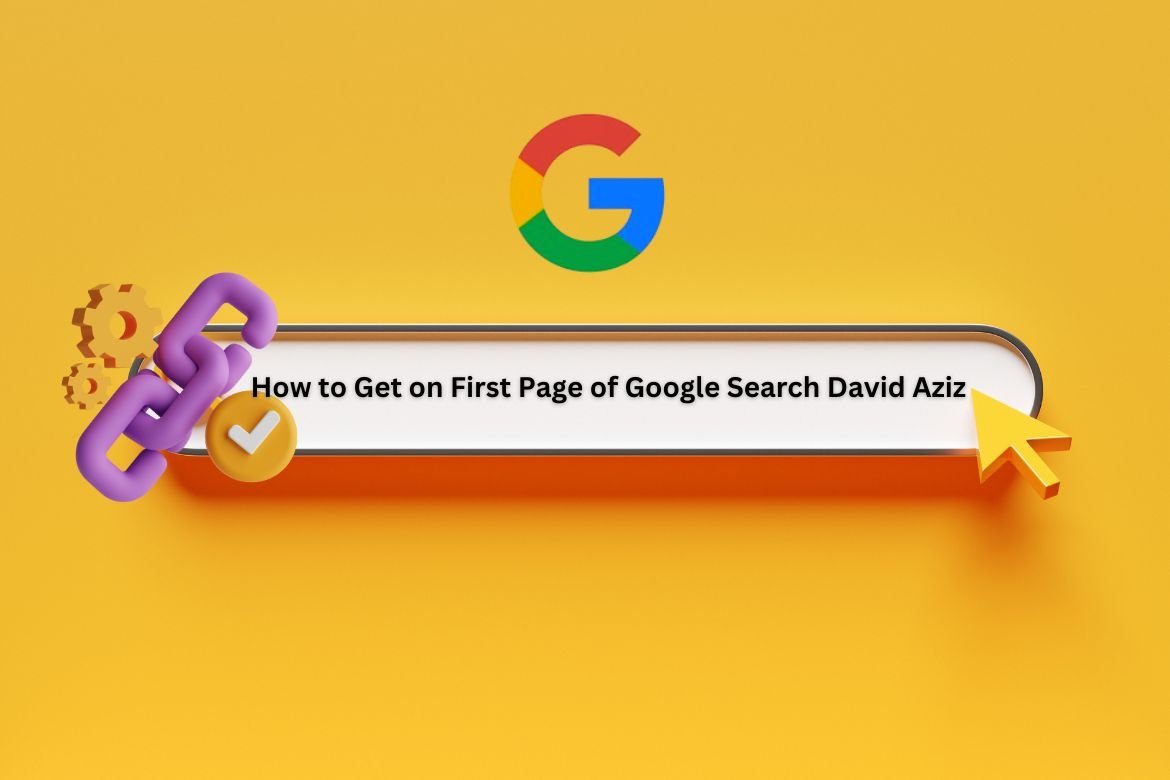Understanding Google Search Rankings
how to get on first page of google search david aziz effectively understand how to get on the first page of Google search results, one must first delve into the mechanics underlying Google’s search rankings. Google employs a complex algorithm that analyzes a vast array of factors to determine which web pages are most relevant for a given search query. These algorithms, continuously updated and refined, are designed to provide users with the most informative and pertinent content, tailored to their search intent.
One critical aspect of this ranking system is Search Engine Optimization (SEO). SEO encompasses various strategies and techniques aimed at enhancing a website’s visibility on search engines. Essentially, it involves optimizing web content through keyword research and implementation, on-page and off-page optimization, and technical adjustments. A well-optimized site not only improves its chances of ranking higher but also increases the likelihood of attracting organic traffic, making SEO a vital component for anyone aiming to achieve a first-page ranking.
Keyword relevance plays a significant role in this process. The keywords utilized in your content should align with the terms users enter in search queries. Understanding user intent—whether informational, navigational, or transactional—can greatly impact the effectiveness of keyword usage. Consistently incorporating relevant keywords enhances the content’s alignment with user searches, thereby increasing the potential of ranking higher on search results.
Moreover, factors such as website loading speed, mobile-friendliness, and user experience (UX) are also integral to Google’s ranking criteria. By addressing these aspects, websites can create an environment that appeals to the algorithm and, more importantly, to users. Overall, comprehending these fundamental elements provides a solid foundation for anyone seeking guidance on how to get on the first page of Google search—a pursuit well articulated by experts like David Aziz.
Key Strategies to Improve Your SEO
Improving your website’s search engine optimization (SEO) is essential for achieving higher visibility and ultimately landing on the first page of Google search results. David Aziz emphasizes a multifaceted approach that combines both on-page and off-page optimization techniques to enhance your website’s performance effectively.
On-page optimization starts with creating high-quality, relevant content that addresses the needs and inquiries of your target audience. Content must be informative, engaging, and structured properly with headers, subheaders, and bullet points where applicable. Using appropriate keywords naturally within the text is essential, as this helps search engines understand the context of your content. For anyone wondering how to get on the first page of Google search, optimizing content quality should be a priority.
Another vital aspect is metadata. Ensure that your title tags, meta descriptions, and header tags are optimized with relevant keywords. This metadata acts as a brief summary of your content for search engines, making it easier to rank your page effectively. Images should also be optimized with proper alt tags, which can impact overall search visibility as well.
Off-page optimization, on the other hand, significantly relies on building backlinks. Quality backlinks from reputable sources signal to search engines that your content is authoritative. Engaging with other platforms, guest blogging, and participating in relevant forums can be effective methods of acquiring these valuable links. It is also beneficial to consider social media’s role in off-page SEO, as promoting your content on these platforms can drive traffic and potential backlinks.
Incorporating these strategies forms a robust foundation for improving your SEO efforts. By focusing on both on-page and off-page techniques, you will increase your chances of achieving that desirable position on the first page of Google search, as advised by experts like David Aziz.

Content Creation Best Practices
Creating high-quality content is paramount when considering how to get on the first page of Google search, as outlined by David Aziz. The primary objective of content should be to provide clear value to readers while simultaneously satisfying search engine algorithms. Engaging content not only addresses user intent but also incorporates effective SEO strategies, which are crucial for strong search visibility.
One of the essential aspects of content creation is keyword integration. It is important to strategically place relevant keywords within the text, but this must be done judiciously to avoid keyword stuffing. Aim for a natural flow in which the keywords, including specific phrases like “how to get on first page of Google search,” are seamlessly integrated into the narrative. Using synonyms and related terms will enrich the content while maintaining its readability and relevance for both users and search engines.
Another key factor is content length. Research indicates that longer articles often perform better in search rankings. However, the focus should be on delivering quality rather than merely hitting a word count. Aim for comprehensive pieces that cover topics thoroughly, ensuring they provide extensive insights on how to get on the first page of Google search. This demonstrates expertise and builds trust with the audience, ultimately improving engagement metrics, such as time spent on the page.
Readability should not be overlooked. Utilize headings, bullet points, and short paragraphs to break up the text and make it easier for readers to digest information. This not only enhances user experience but also signals to search engines that your content is accessible and user-friendly. Additionally, incorporating visuals and multimedia elements can significantly enhance the overall experience. Images, infographics, and videos can effectively illustrate concepts, making the content more engaging and shareable, which is beneficial for increasing visibility in Google search results.
Monitoring Progress and Adapting Strategies
To effectively learn how to get on the first page of Google Search, it is essential to monitor your progress consistently. Numerous tools are available for tracking search performance, such as Google Analytics and Google Search Console. These platforms provide valuable insights into user behavior, organic traffic, and keyword performance, allowing you to gauge your website’s effectiveness in ranking on search engine results pages (SERPs).
When using these tools, it is crucial to focus on key performance indicators (KPIs). Some of the important metrics to monitor include click-through rates (CTR), bounce rates, and average session duration. These metrics can indicate how users interact with your website and reveal areas needing improvement. For instance, a high bounce rate may suggest that visitors are not finding what they expect, requiring a review of website content or user experience.
how to get on first page of google search david aziz Additionally, interpreting analytics data involves understanding fluctuations in search rankings over time. Changes in rankings could result from algorithm updates, shifts in user intent, or increased competition. Regularly reviewing this data enables you to identify trends that inform your strategy. For example, if specific keywords previously driving traffic have lost their effectiveness, you may need to explore related phrases or focus on content improvement to enhance relevance.
Flexibility is also vital in maintaining your position on the first page of Google Search. Digital marketing and SEO are ever-evolving fields; thus, adapting your strategies according to the latest trends and insights is necessary. Experiment with different types of content, such as videos or infographics, and observe their impact on engagement. A proactive approach will empower you to cultivate an effective SEO strategy, ensuring your website remains competitive and relevant.
